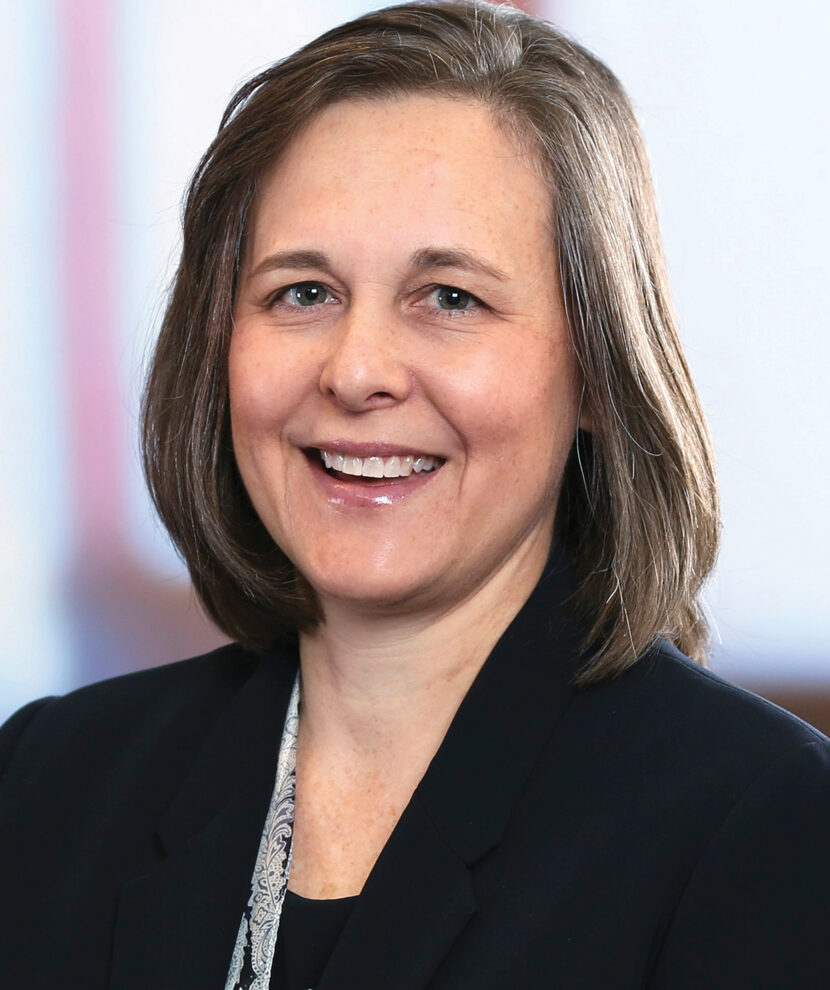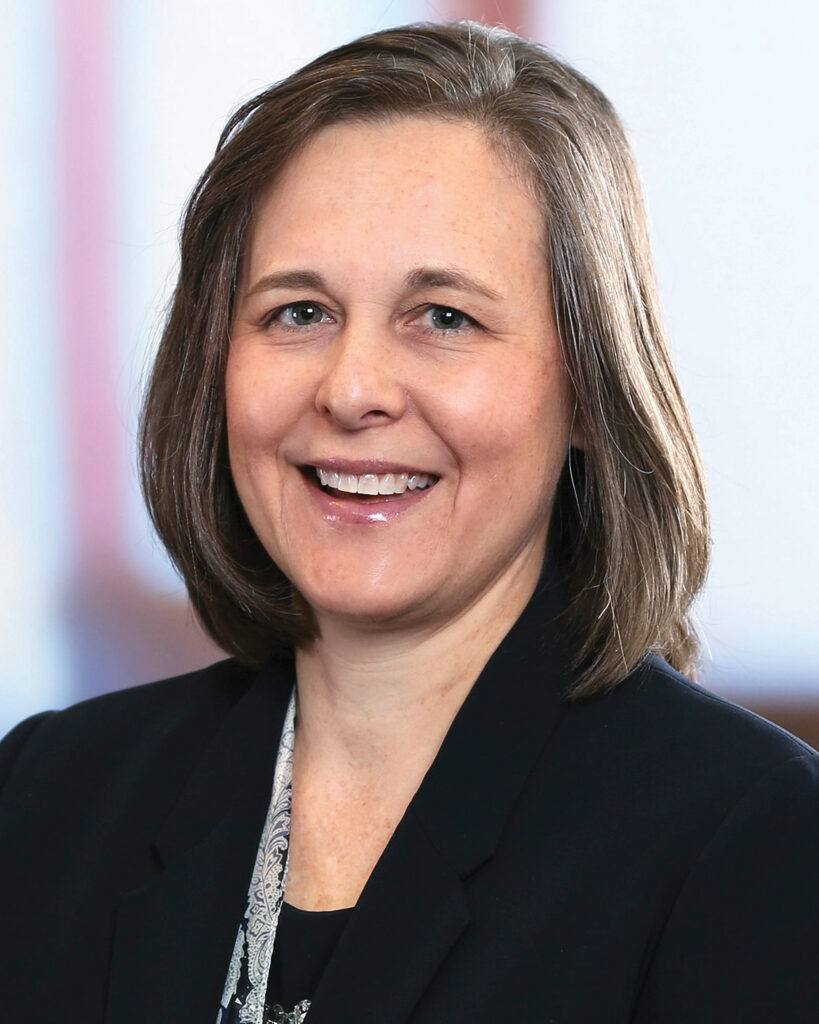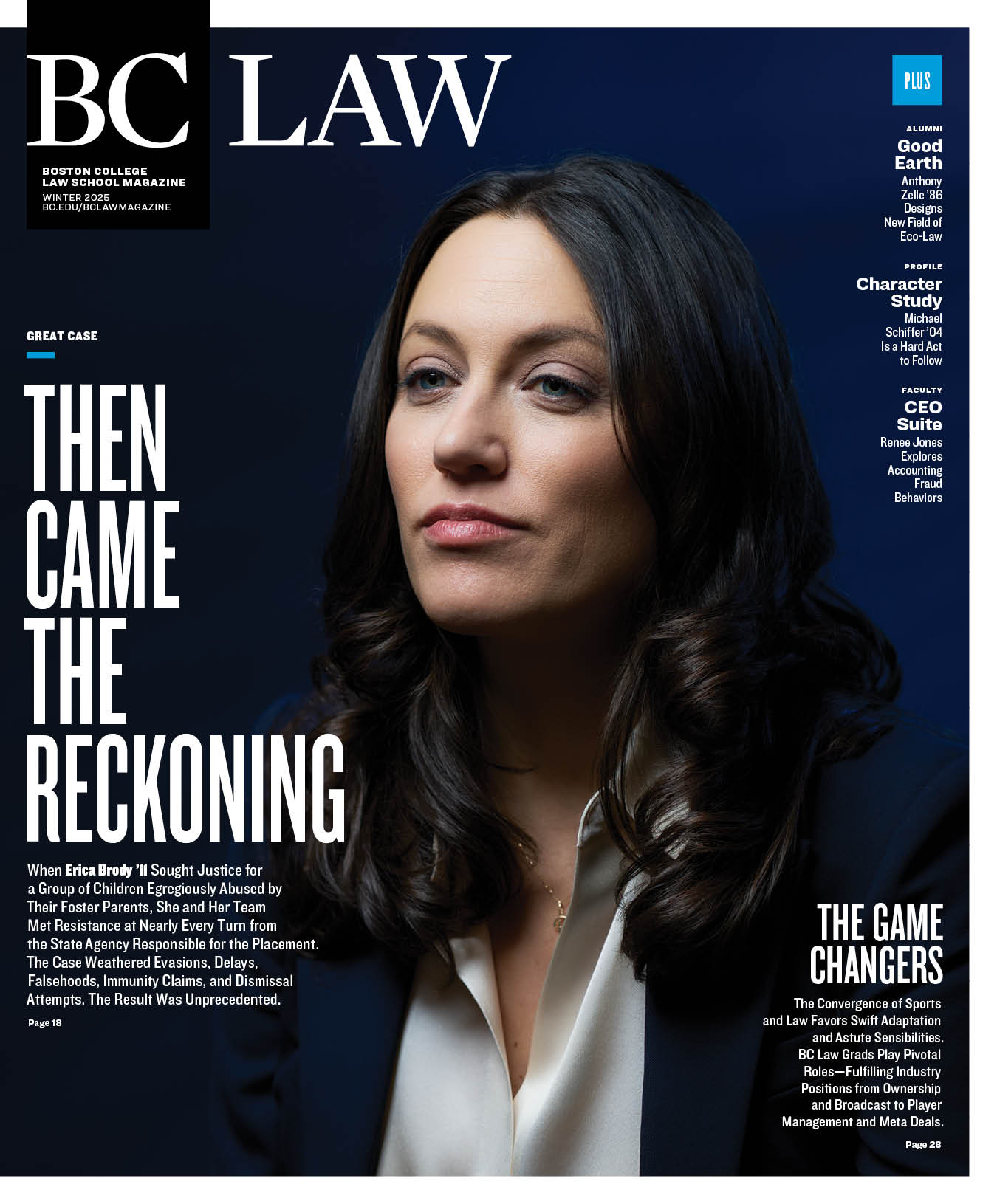When Susan Finegan ’91, chair of the Pro Bono Committee at Mintz and recipient of the Boston Bar Association’s Thurgood Marshall award, entered law school at Boston College, she did so wanting to be a public interest lawyer and thinking that “the world was black and white—you go to the private sector, or you go to public interest,” she said. “But I think my career is one that has shown it’s pretty gray. My job today is a great example of how you can integrate both.”
An immigration class at BC Law, and extra credit work on an asylum case with a pro bono lawyer in Boston, gave her an early view of that integration. So, after graduation and a clerkship, she began working at Mintz because of its well-respected pro bono program and strong litigation practice. In her second week at the job, a peer at the firm invited her to join an asylum case. “We just jumped in, and though we weren’t exactly sure what we were doing, we had the right mentorship, and ended up getting a client out of ICE detention,” Finegan said.
Today, as a lead partner, Finegan not only chairs Mintz’s Pro Bono Committee, but is also directly involved in several high-profile litigation cases from the firm’s roughly 325 pro bono matters. Within her current caseload, as the firm’s pro bono partner, are civil rights, immigration, and gender-based violence cases. Finegan is drawn to clients whose lives she can impact—whether that be through individual cases, legislation, or impact litigation.
In one asylum case, she actually helped to save a life. It involved Oscar Alfredo Ramírez Castañeda, a thirty-one-year-old undocumented Guatemalan living in Framingham, Mass., whose story is told in the Spielberg-produced documentary, Finding Oscar.
During the 1982 Guatemalan civil war, when Oscar was just three years old, 250 men, women, and children in his village of Dos Erres were mass-murdered by army commandos, among them Oscar’s mother and eight siblings. One of the commandos, Lt. Ramírez Ramos, abducted little Oscar, and Oscar grew up believing that Ramírez was his father. When the civil war ended in 1996, Guatemalan prosecutor Sara Romero was tasked with bringing the perpetrators of the Dos Erres massacre—now government leaders in Guatemala—to justice. Her investigation revealed that Oscar had been raised by Ramírez’s family, and he was living in the United States. Romero tracked him down, disclosed to him his history, and a DNA test led to his reunion with his biological father, a farmer named Tranquilino Castañeda, who had been out working in the fields when the 1982 massacre occurred.
Susan Finegan not only chairs Mintz’s Pro Bono Committee, but is also directly involved in several high-profile litigation cases from the firm’s roughly 325 pro bono matters.
This DNA testing of the two matched with the bones of the rest of their family located in a mass grave, and prosecutors now had a key piece of evidence to prove that the massacre had occurred. But Oscar was now living evidence of the massacre, instrumental to the prosecution of a high profile international human rights trial, and was in need of protection. Pro bono lawyers filed for political asylum on his behalf, and Finegan led the Boston-based team in a successful asylum victory.
In 2017, another significant matter took Finegan in a different legal direction.
On the morning after President Donald Trump enacted his Muslim travel ban, the then-president of the American Immigration Lawyers Association in Massachusetts reached out to Finegan to ask that she keep her phone on, as the group would likely be heading into court that Saturday to fight the ban.
At 8:30 that evening, while attending the Boston Bar Foundation’s annual gala, Finegan received the call, and she and a few colleagues left for the airport where hundreds of people were protesting the ban. By 10 p.m., Finegan, working with ten others and the American Civil Liberties Union, filed a motion for injunctive relief in federal court, which opened that night for a last-minute hearing. At 2:30 a.m. the next morning, the court issued an injunction, which turned out to include the broadest language of any of the injunctions issued around the country that night. As a result, many incoming travelers would reroute through Boston’s Logan Airport in the following week.
In Finegan’s practice, it’s always important to be open to collaboration and creative solutions. For ten years, she worked with other advocates to expand the restraining order laws in Massachusetts, so that sexual assault and stalking victims could obtain restraining orders against people with whom they were not in a relationship or who did not live in the same household. Survivors had previously not been able to get an order of protection if they had been raped by a neighbor or a work colleague. Finegan also worked to aid hundreds of people who were in danger of retaliation by the Taliban—many due to their assistance of the US military—after the US government pulled out of Afghanistan.
“A lot of times you are as prepared as you can be and have a game plan, but some things outside of your control come at you that you could not have anticipated,” Finegan said. “So, you have to rely on your colleagues, your instincts, and just try different approaches to solve your clients’ problems, which keeps the job interesting.”




